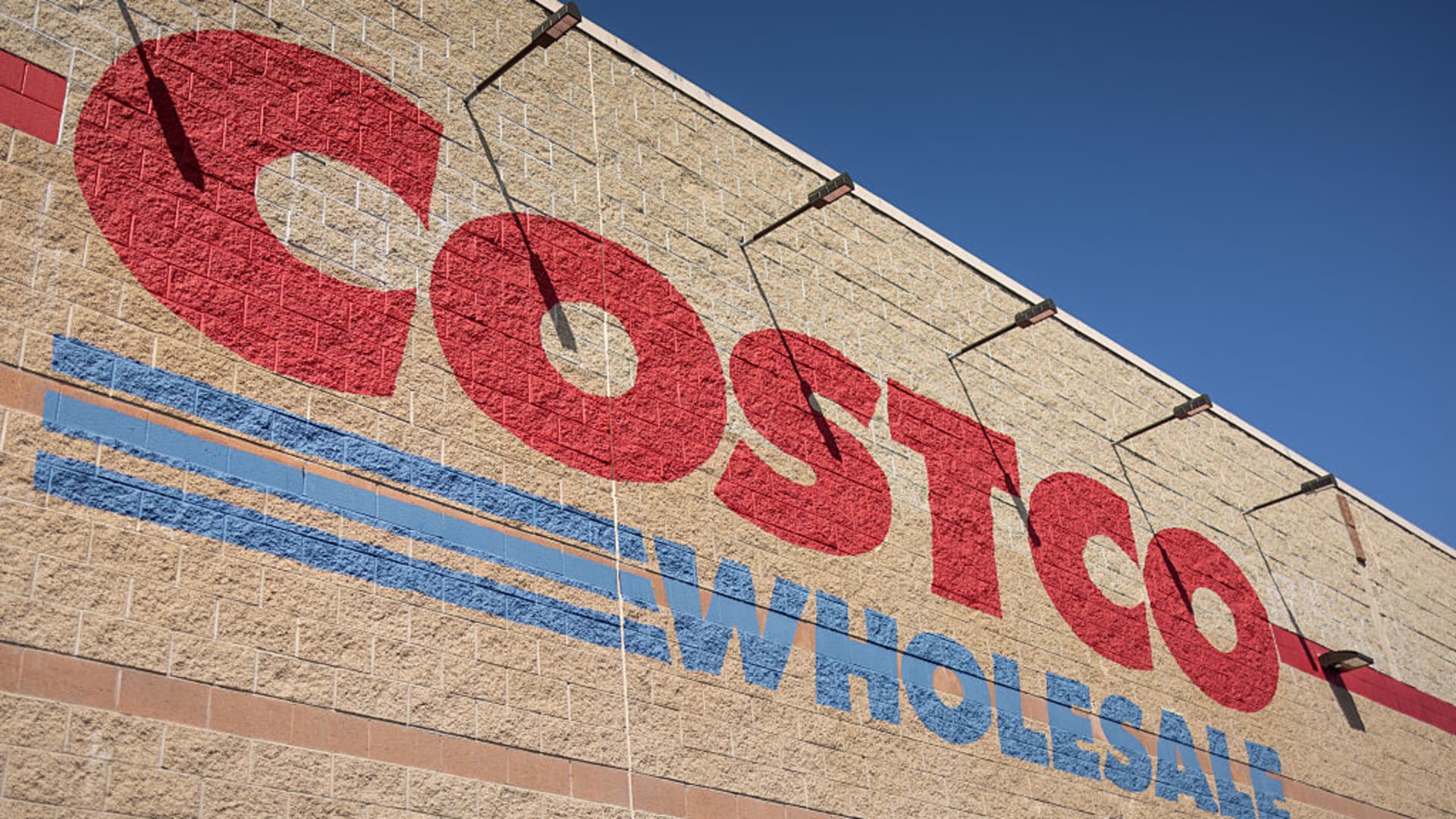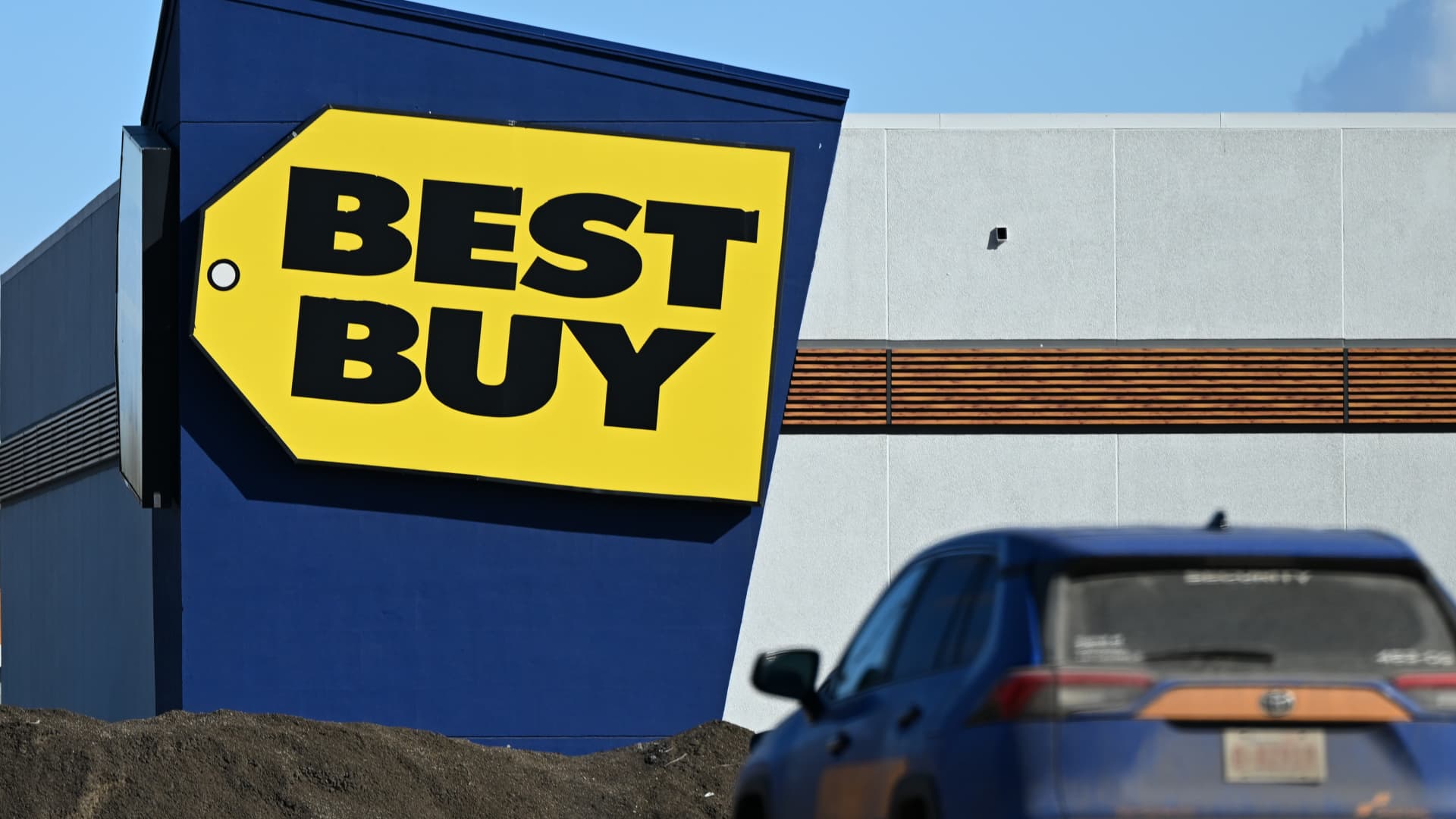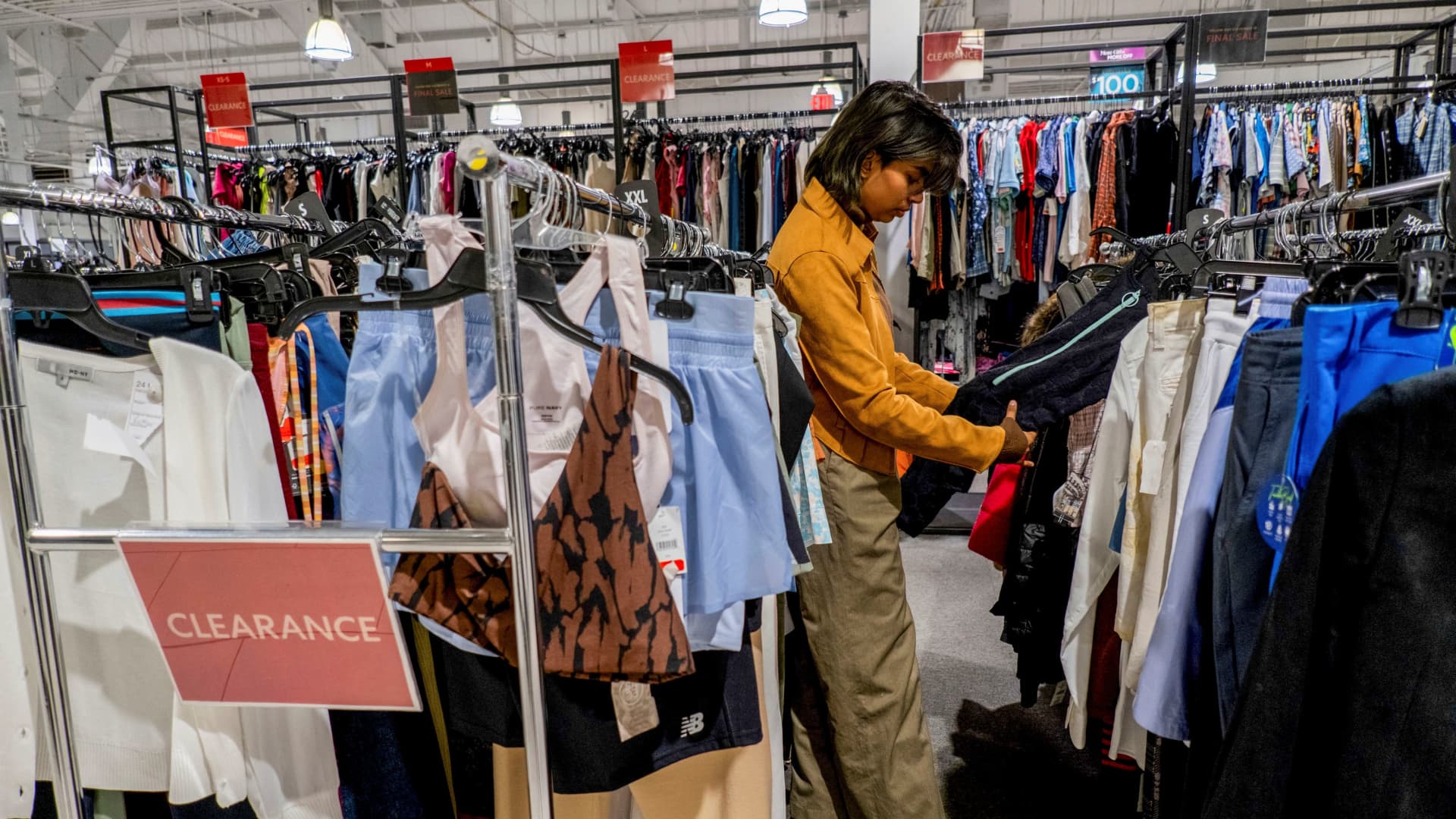Global Trends and Politics
Costco Q3 2025 Earnings Report

Introduction to Costco’s Quarterly Earnings
The sign on the side of a Costco is seen in Hawthorne, California, on April 4, 2025. Costco on Thursday posted quarterly earnings and revenue that topped estimates as its sales climbed 8%.
Quarterly Earnings and Revenue
Here’s how the warehouse club retailer did in its fiscal third quarter compared to what Wall Street was expecting:
- Earnings per share: $4.28 vs. $4.24 expected
- Revenue: $63.21 billion vs. $63.19 billion expected
Net Income and Revenue Growth
Costco’s net income for the three-month period that ended May 11 rose to $1.90 billion, or $4.28 per share, compared to $1.68 billion, or $3.78 a year earlier. Revenue rose from $58.52 billion in the year-ago period.
Impact of Tariffs on Costco
As tariffs raise economic worries, and potentially consumer prices, Costco could stand to benefit. Unpredictable tariff policy could help drive more customers to the warehouse club, which is known for its competitive prices and bulk discounts, and encourage them to renew membership. Its clubs also sell discounted gas and groceries, which are steadier traffic drivers even when consumers pull back on spending. And compared with some other retailers, Costco has a stronger hand in price negotiations with suppliers because of its large size.
CEO’s Perspective
On the company’s earnings call in March, CEO Ron Vachris said customers rely on Costco more in a challenging economy. "In uncertain times, our members have historically placed even greater importance on the value of high-quality items at great prices, and our teams will continue to rise to this challenge by leveraging our global buying power, strong supplier relationships and innovation," Vachris said at the time.
Imports and Tariff Effects
About a third of Costco’s U.S. sales are goods brought in from other countries, with less than half of those imports coming from China, Mexico, and Canada, Vachris said in March. Yet tariffs could also add expenses for Costco, which could mean higher prices for shoppers.
Industry Comparison
Earlier on Thursday, Best Buy CEO Corie Barry said the retailer had already raised prices on some consumer electronics because of tariffs. Cosmetics company E.l.f. Beauty announced a price increase on its makeup last week. And Walmart CFO John David Rainey warned earlier this month that higher prices were coming to the discounter’s stores and website in late May or June.
Stock Performance
As of Thursday’s close, shares of Costco are up about 10% so far this year. That has outpaced the S&P 500’s less than 1% gains during the same period.
Conclusion
Costco’s quarterly earnings and revenue have topped estimates, with an 8% climb in sales. The company’s ability to negotiate prices with suppliers and its focus on value could help it navigate the challenges posed by tariffs. However, the impact of tariffs on consumer prices remains a concern.
FAQs
- Q: How did Costco perform in its fiscal third quarter?
A: Costco posted quarterly earnings and revenue that topped estimates, with sales climbing 8%. - Q: What is the impact of tariffs on Costco?
A: Tariffs could drive more customers to Costco due to its competitive prices, but may also add expenses and lead to higher prices for shoppers. - Q: How does Costco’s performance compare to the industry?
A: Costco’s stock is up about 10% this year, outpacing the S&P 500’s gains, while other retailers like Best Buy and Walmart have announced price increases due to tariffs. - Q: What did Costco’s CEO say about the company’s strategy?
A: CEO Ron Vachris said customers rely on Costco more in challenging economic times and that the company will continue to leverage its global buying power and strong supplier relationships to offer value to its members.
Global Trends and Politics
Best Buy Q1 2026 Earnings Report

Introduction to Best Buy’s Quarterly Earnings
Best Buy on Thursday missed quarterly revenue expectations and cut its full-year sales and profit guidance as higher tariffs increase the costs of many consumer electronics that it sells. For its fiscal 2026, the retailer said it now expects $41.1 billion to $41.9 billion of revenue, down from its previous range of $41.4 billion to $42.2 billion. It said it expects adjusted earnings per share to range from $6.15 to $6.30, which compares with prior guidance of $6.20 to $6.60.
Impact of Tariffs on Best Buy
Best Buy already increased prices on some items to blunt the costs from tariffs, with changes taking effect by mid-May, CEO Corie Barry said on a call with reporters. She called price hikes "the very last resort" after the company takes other steps to offset higher expenses. But she declined to specify which items are affected, citing competitive reasons. First-quarter earnings reports have highlighted just how disruptive President Donald Trump’s ever-evolving trade policy has been to many U.S. companies that rely on a global supply chain. Best Buy joins other companies like Abercrombie & Fitch and Macy’s in cutting its profit outlook this week due to tariffs.
Comparison with Wall Street Expectations
Here’s how the consumer electronics company did compared with what Wall Street was expecting for the company’s fiscal first quarter:
- Earnings per share: $1.15 adjusted vs. $1.09 expected
- Revenue: $8.77 billion vs. $8.81 billion expected
Shares of Best Buy closed at $66.32, down about 7%. Best Buy’s net income in the three-month period that ended May 3 declined about 18% to $202 million, or 95 cents per share, from $246 million, or $1.13 per share, in the year-ago period. Excluding one-time expenses, including restructuring charges for its Best Buy Health business, the company reported earnings of $1.15 per share.
Sales Performance
First-quarter revenue dropped from $8.85 billion in the year-ago period. Comparable sales, defined by Best Buy as revenue from online sales and stores open at least 14 months, dropped 0.7% year over year. In the U.S., comparable sales also fell 0.7% year over year as shoppers bought fewer home theaters, appliances and drones than a year ago. The company said weakness in those categories was partially offset by growth in the computing, mobile phone and tablet categories.
Adjustments to Tariffs
Best Buy is a closely watched name when it comes to the impact of tariffs since it sells iPhones, TVs, laptops, kitchen appliances and many other consumer electronics that tend to be made in China or other parts of Asia. That’s why Barry said on a March earnings call that the retailer would likely have to raise prices because of the duties. However, Barry said on a separate earnings call Thursday that Best Buy’s mix of imports has changed in recent months. China continues to be a major source of merchandise, but the country now accounts for 30% to 35% of its merchandise compared with the 55% metric that it shared in March.
Strategic Priorities
Barry on the Thursday earnings call outlined ways that Best Buy is adjusting to current tariffs, while acknowledging the backdrop could change after the court ruling. The vast majority of what the retailer sells — about 97% or 98% of its merchandise — is imported by vendors rather than directly by the company. Best Buy has encouraged vendors to manufacture in multiple countries, negotiated lower costs and adjusted the mix of merchandise that it carries, she said. On the earnings call, Barry pointed to Best Buy’s strategic priorities for the year that will help the company increase profits and control costs.
Conclusion
In conclusion, Best Buy’s quarterly earnings report highlights the impact of tariffs on the company’s sales and profit guidance. Despite the challenges, the company is taking steps to adjust to the current trade policy and is focusing on its strategic priorities to increase profits and control costs. With new product launches and growth in certain categories, Best Buy is well-positioned to navigate the changing retail landscape.
FAQs
Q: What is the expected revenue range for Best Buy’s fiscal 2026?
A: $41.1 billion to $41.9 billion
Q: How did Best Buy’s comparable sales perform in the first quarter?
A: Comparable sales dropped 0.7% year over year
Q: What is the impact of tariffs on Best Buy’s prices?
A: Best Buy has increased prices on some items to blunt the costs from tariffs
Q: What are Best Buy’s strategic priorities for the year?
A: Improving the customer experience, launching and growing its third-party marketplace and advertising businesses, and driving efficiency to fund strategic investments and offset pressures
Q: How did Best Buy’s net income perform in the first quarter?
A: Net income declined about 18% to $202 million, or 95 cents per share
Global Trends and Politics
Hamptons Summer Rentals Plunge 30%

Introduction to Hamptons Rentals
Summer rentals in the Hamptons are off to a slow start, with unrented homes piling up and sales slowing down, according to brokers. Judi Desiderio of William Raveis Real Estate reports that Hamptons rentals are down 30% from the same period in previous years. Brokers who focus on ultra-high-end rentals are seeing an even bigger drop, with their rental business down between 50% and 75%.
Factors Contributing to the Decline
Some renters may be holding out for better deals or waiting to book, but brokers privately say there are other factors at play. Enzo Morabito, head of the Hamptons-based Enzo Morabito Team at Douglas Elliman, states that "people are holding on to their money" due to uncertainty. The volatility in the stock market and economic uncertainty sparked by the ever-changing tariff landscape has made some affluent renters and even some buyers hold off on a pricey Hamptons vacation this summer.
Impact on Homeowners and Brokers
Morabito represents several homeowners with large waterfront and luxury properties that typically would have been rented by March or April, but are still available. Some homeowners who rent out three or four homes in the Hamptons during the summer may start to question their investments after this summer if renters don’t start emerging. Brokers are seeing a surge in unrented inventory, which means potential bargains and choice for renters.
Shift in Rental Strategies
As a result of the decline, some listings have started lowering their prices by 10% to 20% in hopes of saving the summer. Some homeowners are adding more flexibility, allowing for shorter one- or two weeks stays in hopes of getting renters. Gary DePersia of My Hampton Homes notes that the best houses in the Hamptons typically get rented early in the year, but this year he has great rentals available in every town, from Southampton to Montauk.
Economic Uncertainty and Tariffs
While tariffs and economic uncertainty may play a role in the slump, DePersia says renters seem to have been waiting longer and longer every year, perhaps holding out for better deals. Eventually, he says, they end up renting. Desiderio believes that the combination of weather and grim economic headlines made for a slow start that will quickly reverse.
Home Sales in the Hamptons
When it comes to home sales, the Hamptons real estate market remains fairly strong, despite relatively low inventory. Sales in the first quarter were down 12% from a year ago, although the median sales price jumped 13% to a record $2 million. Brokers say when a quality home in the Hamptons is priced right, it sells immediately.
Conclusion
In conclusion, the Hamptons rental market is experiencing a slow start to the summer season, with a decline in rentals and a surge in unrented inventory. However, brokers remain optimistic that the market will pick up as the summer progresses. With potential bargains and choice for renters, the Hamptons may still see a strong summer season.
FAQs
Q: What is the current state of the Hamptons rental market?
A: The Hamptons rental market is down 30% from the same period in previous years, with ultra-high-end rentals seeing an even bigger drop of 50-75%.
Q: What factors are contributing to the decline in rentals?
A: Uncertainty, volatility in the stock market, and economic uncertainty sparked by the ever-changing tariff landscape are contributing to the decline in rentals.
Q: How are homeowners and brokers responding to the decline?
A: Some listings are lowering their prices by 10-20%, and homeowners are adding more flexibility to their rental agreements, such as allowing for shorter stays.
Q: What is the current state of the Hamptons home sales market?
A: The Hamptons home sales market remains fairly strong, despite relatively low inventory, with sales in the first quarter down 12% from a year ago, but the median sales price jumping 13% to a record $2 million.
Global Trends and Politics
Retailers Raising Prices

Impact of Tariffs on Retailers
Consumers who hoped tariffs would not hit their wallets keep getting bad news. As they reported earnings in recent weeks, multiple major retailers said they have already raised some prices or plan to hike them in the coming weeks to offset the duties. They include major grocers and consumer goods sellers Costco, Best Buy, Walmart, and Target.
President Donald Trump’s ever-changing trade policy has roiled retailers as they try to plan their supply chains. On earnings calls, they faced the difficult task of trying to appease investors who want them to protect their bottom lines and shoppers who could balk at price hikes.
In some cases, companies have been explicit, citing the estimated toll tariffs will take on their bottom lines and breaking down which countries their supply chains rely on. Other retailers have been less forthcoming, avoiding the word "tariff" and instead blaming strategy shifts or price hikes on "macroeconomic uncertainty" — or simply refusing to point the finger at all.
Many retailers have reduced or withdrawn their full-year guidance because of tariffs. Companies such as Abercrombie & Fitch, Macy’s, and Best Buy have slashed their profit outlooks. Meanwhile, American Eagle, Canada Goose, Ross, and Mattel pulled their full-year guidance.
After Trump implemented steep tariffs on dozens of countries in April, his administration has temporarily cut them to lower — but still significant — levels. Imports from China face a 30% duty, while goods from many other nations are subject to a 10% duty. A federal trade court struck down many of those tariffs on Wednesday, only for an appeals court to reinstate them, adding to the uncertainty retailers face.
Economists on both sides of the aisle agree that tariffs are inflationary and the cost will likely be passed on to consumers, though government data has not showed a clear effect yet. A majority, 68%, of U.S. CEOs say they have either increased prices already or are considering doing so this year in the face of tariffs, according to a new survey by Chief Executive Group and AlixPartners.
Retailers’ Plans to Raise Prices
Here’s a breakdown of what several major retailers have said about their plans to raise prices as a way to mitigate the tariff impact.
Brands that have already raised some prices
Customers look over personal health items displayed at a Costco branch.
Executives of the warehouse club retailer told investors that tariffs have forced the company to tweak its supply chain and raise prices in some cases. Costco has absorbed tariff costs for some goods, while it has increased prices in other instances, said CFO Gary Millerchip.
Best Buy has already raised prices on some items to offset tariff costs, CEO Corie Barry said on a call with reporters. Changes took effect by mid-May. She declined to say which items are affected and called price hikes "the very last resort" for Best Buy.
On SharkNinja’s latest earnings call in May, CEO Mark Barrocas said the company has already increased prices for several of its key products in response to tariffs and will "continue to look for additional opportunities" to do so. As an example, he said the company recently raised the price of one of its Ninja espresso machines from $499 to $549 and saw "no degradation in demand."
Executives from Newell Brands, which owns stroller company Graco as well as Rubbermaid, Yankee Candle, Paper Mate and Sharpie, said during an April 30 earnings call that the company has raised prices on its baby gear by about 20%. The company said it is equipped to handle Trump’s tariffs, unless he raises duties on imports from China again, since the majority of baby gear sold in the U.S. is made in China.
Retailers that say they plan to increase prices
Walmart shoppers will likely see price increases toward the end of May and more in June because of tariffs, said Chief Financial Officer John David Rainey during an interview. Executives did not specify during the company’s most recent earnings call how much more Walmart c
-

 Career Advice6 months ago
Career Advice6 months agoInterview with Dr. Kristy K. Taylor, WORxK Global News Magazine Founder
-

 Diversity and Inclusion (DEIA)6 months ago
Diversity and Inclusion (DEIA)6 months agoSarah Herrlinger Talks AirPods Pro Hearing Aid
-

 Career Advice6 months ago
Career Advice6 months agoNetWork Your Way to Success: Top Tips for Maximizing Your Professional Network
-

 Changemaker Interviews5 months ago
Changemaker Interviews5 months agoUnlocking Human Potential: Kim Groshek’s Journey to Transforming Leadership and Stress Resilience
-

 Diversity and Inclusion (DEIA)6 months ago
Diversity and Inclusion (DEIA)6 months agoThe Power of Belonging: Why Feeling Accepted Matters in the Workplace
-

 Global Trends and Politics6 months ago
Global Trends and Politics6 months agoHealth-care stocks fall after Warren PBM bill, Brian Thompson shooting
-

 Global Trends and Politics6 months ago
Global Trends and Politics6 months agoUnionization Goes Mainstream: How the Changing Workforce is Driving Demand for Collective Bargaining
-

 Training and Development6 months ago
Training and Development6 months agoLevel Up: How Upskilling Can Help You Stay Ahead of the Curve in a Rapidly Changing Industry









